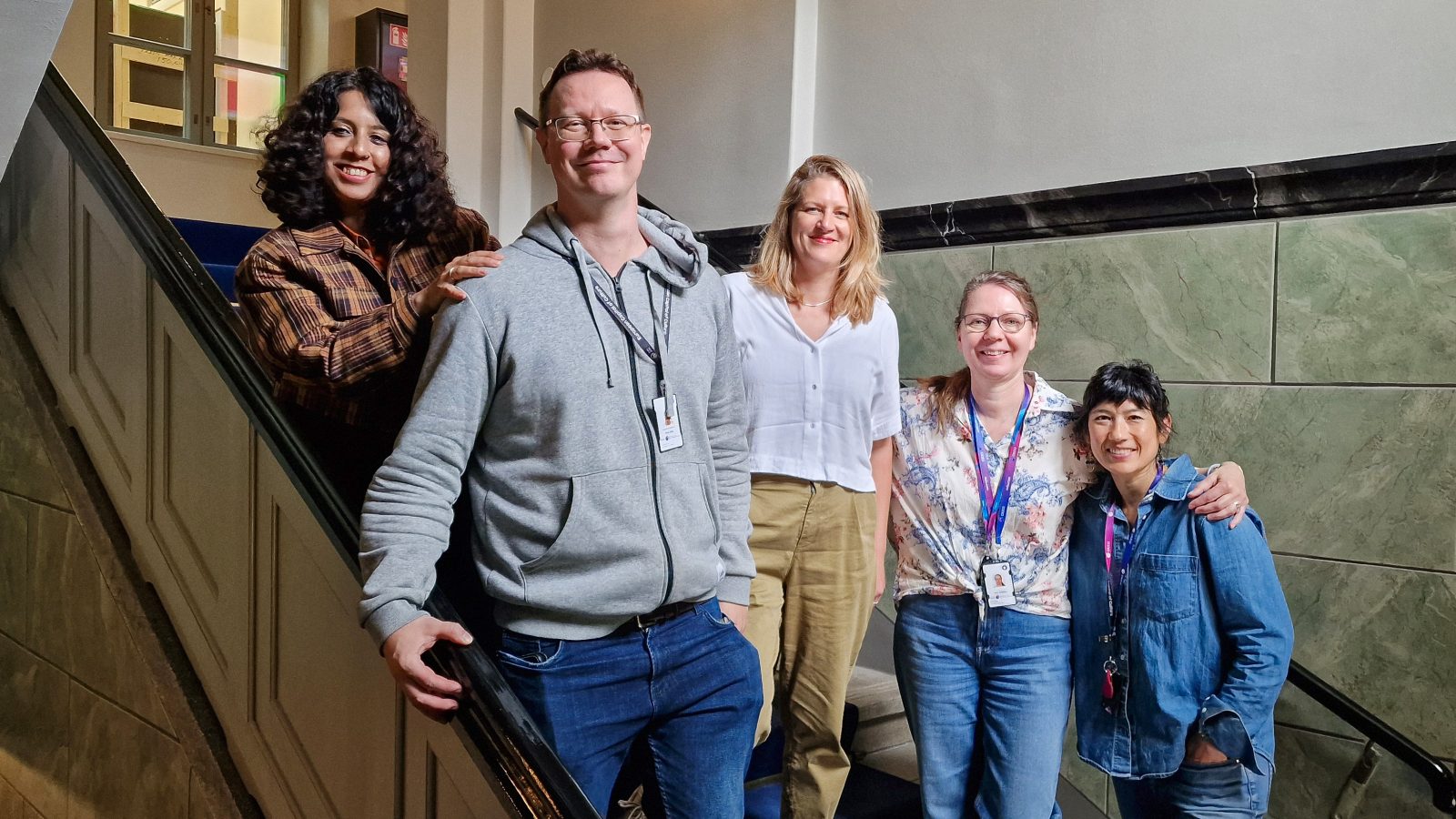My Oulu: An anti-racist Oulu is a good city for everyone

Priyanka Sood (left), Petri Juka, Paula Lähdesmäki-Wilson, Päivi Suhonen and Arlene Tucker want to promote safe and good Oulu for all population groups with their project. Photo: Päivi Suhonen.
The Oulu for All project aims to promote interaction and trust between different population groups. Additionally, the project seeks methods for anti-racism work. “Racism will never end in the world, but its negative effects can be reduced and respect between each other can be increased. Besides, a safe Oulu benefits everyone,” explains Project Manager Priyanka Sood who is in charge of the project.
The Oulu for All (Kaikkien Oulu) project launched in March of 2025, and Päivi Suhonen, Petri Juka, Paula Lähdesmäki-Wilson, and Arlene Tucker were hired as project coordinators. They have already organized the first dialogue event for non-Finnish speakers and immigrants in Oulu.
“The events are great opportunities to hear those whose voices are often not heard sufficiently. At the first event, we heard proposals for establishing an anti-racism support centre in Oulu. The discussion showed us that there was a need for an easily accessible support centre where encounters are equal,” Juka explains.
The anti-racism support centre is expected to be opened in late 2025.
“Its location is still undecided. Developing such a support centre has been started from scratch. The development work has been supported by the Prime Minister’s Office, Ministry of Justice, and the European Coalition of Cities Against Racism. Locally, the support centre’s design has been developed in cooperation with significant stakeholders, such as Pohde, the ELY-centre, the Regional State Administrative Agency, the Police Department, Victim Support Finland, and the Arbitration Office”, explains Project Manager Priyanka Sood.
Acknowledgement is the way forward
The project aims to train city personnel extensively for anti-racism work. In the early stages, training regarding the support centre’s operations has been organized. Third sector employees and Pohde employees also participated in the training.
“Our goal is to ensure that there is enough competency in the city to recognize racism, as well as readiness to support victims of racism,” the team members explain.
Six per cent of Oulu’s population do not speak Finnish as their native language. According to Lähdesmäki-Wilson, city personnel should acknowledge all forms of racism – they should also recognize their own prejudices.
“Additionally, we are certain that there is a lot of competency in the city that is not yet utilized. This is a good opportunity. For example, early childhood education should have personnel from different backgrounds.”
In fact, one of the project’s focus points is to promote awareness and examine the unacknowledged prejudices of everybody. One example of unacknowledged attitudes is guiding immigrants only into specific professional fields.
“In schools, student counselors often recommend jobs in the care sector for students with immigrant backgrounds. Another example is speaking English to immigrants even if they speak Finnish, or without even figuring out whether or not they speak Finnish,” Sood points out.
“In working life, people do not get job interviews based on their names. And when Romani people go to grocery stores, they are immediately considered suspicious.”
The project team also reminds that the reasons for such behavior are not always malicious but come about due to lack of consideration or knowledge.
Youth participation is essential
Preventing racism among youth is one of the projects most significant actions. A campaign and training package are currently being prepared. They will offer young people an opportunity to consider their own anti-racism competency and their own actions.
“It is even more important that the work we do with the youth helps them create a sense of belonging in their home city Oulu. Their participation is essential in order for their voices to be heard. Interaction and training increase awareness, for example, about prejudices, identities and power,” Arlene Tucker states. During the project, Tucker has worked with young people through art in the Valkea Youth Centre, where youth have been able to share their feelings, needs, and thoughts boldly and safely.
“It has been amazing and meaningful to see how creating art offers opportunities to approach personal and difficult matters,” Tucker adds.
In September, an anti-discrimination forum was held, the theme of which was diverse recruitment. The goal was to gather a multisectoral influencer network including, among others, city administration, non-Finnish speaking citizens, the University of Oulu, and different organizations.
The Oulu for All project implements the city of Oulu’s Anti-Racism Operational Programme which was approved by the City Board after the violent crimes targeting people with immigrant backgrounds stirred the city of Oulu in the summer and fall of 2024. The project is partially funded by the European Social Fund and operates from 2025–2027. The Oulu for All project’s budget is 1,2 million euros, of which the city is responsible for 20 per cent.
The discussion continues at the Oulu Theatre
- A dialogue event will be held in cooperation with the Oulu Theatre and the city of Oulu. The series of events serve as a venue for societal dialogue regarding the themes of the city’s Anti-Racism Operational Programme.
- The event will be organized on Friday October 3, 2025, at 17.00–18.30 in the Oulu Theatre’s restaurant Aulis (Kaarlenväylä 2). The discussion will be led by Community Mediator and Work Manager Miriam Attias.